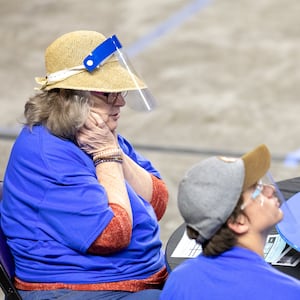Election vigilantes are knocking on doors, filming homeowners, and interrogating them on their 2020 votes. But at least some of these pro-Trump groups say they’ve started screening out volunteers with “pedophilic leanings.”
More than a year after Donald Trump’s 2020 election loss, his diehard fans remain convinced that he is still the rightful president, even though their claims are flimsier than they were in December 2020. Repeated election reviews, including those by pro-Trump conspiracy theorists, have upheld President Joe Biden’s victory. So now, election denialists are pitching themselves into voter “canvassing,” a tactic that involves ringing doorbells and asking people how they voted.
Voters say it’s weird. Trump fans say it’s their next hope at overturning the election.
“This lie that the election was rigged has already done a great deal of damage and continues to do damage in a number of different ways,” Sean Morales-Doyle, acting director of the Brennan Center For Justice’s Democracy Program, told The Daily Beast. “Going around door to door and continuing to spread this misinformation can only do more harm.”
Until late September, election “audits” were the far right’s great hope for reinstalling Trump. Then their favorite audit—a chaotic, Republican-led, conspiracy-fueled review of Maricopa County, Arizona’s 2020 results—revealed that Biden had in fact received more votes than Trump.
Following that flop, Trump fans searched for reasons why pro-Biden votes were actually suspect. They latched onto a “canvassing” report, released by a failed GOP candidate earlier that month, that purported to show hundreds of thousands of suspicious votes or voter registrations. In fact, as Arizona journalists and officials quickly noted, the report cited virtually no evidence for its claims. The initial report’s one specific example (voters supposedly registered to a vacant lot) was soon debunked, with experts noting that the site was a legitimate home with three occupants.
Still, with audits losing popularity, some prominent election denialists have championed canvasses as the next best thing.
“Given the enemy’s intentional acts to sabotage the audits, I am told that the best course of action is canvassing,” QAnon-friendly attorney Lin Wood posted on Telegram late last month. He cautioned that some of the people whose homes canvassers visited might be enemies trying to trick them.
“But the questions asked in the canvassing process are important and the enemy may try to mislead you,” Wood wrote. (He doubled down on the canvassing-over-audits message several days later.)
Some of the shift toward canvasses, previously noted by Trapezoid of Discovery, appears driven by recent schisms in the far right. Wood, and several Telegram-based canvassing promoters, are currently on the outs with other fringe figures like former Overstock CEO Patrick Byrne, who helped fund the Maricopa County audit.

Empty chairs in Phoenix after the announcement of interim findings from a widely criticized audit of the 2020 election.
Mike Blake/ReutersAnd outside Maricopa County, audit efforts have stalled, due to lack of participation from elected officials, who have to sign off on the costly and controversial reviews. Canvassing, which requires nothing more than a team of dedicated door-knockers, has fewer barriers.
In some states, it’s been underway for months.
In August, Pennsylvania residents reported visits from members of Audit The Vote Pennsylvania, a right-wing group that has tried for months to spearhead an Arizona-style audit of Pennsylvania’s election. During those visits, self-identified “election integrity” teams reportedly asked locals about their 2020 votes, prompting some of those residents to lodge complaints with local government officials.
Some of those officials described the tactic as an attempt to harass voters. "This is 100% voter intimidation and attempts to suppress voters in the future," Chad Baker, chair of York County, Pennsylvania’s Democratic Party, told the York Daily Record in August.
ATVPA has previously disavowed calls to violence that stemmed from those audit efforts. “The commissioners in Tioga County are receiving death threats,” an ATVPA leader wrote on Telegram this summer. (Tioga County was one of the group’s targeted areas of supposed election malfeasance.) “We never ever would condone violence and we would never advocate for that.”
The group has hit some canvassing barriers. In October, a moderator on the group’s Telegram expressed frustration that, when they tried questioning people at a nursing home, they were only able to speak with two residents. But during a late-September call-in to a conservative radio show, ATVPA founder Toni Shuppe claimed her group was canvassing “on the ground in 20 counties” claiming they had found issues with voting registrations and records. “We easily have enough anomalies to reverse the election,” Shuppe said.
The day after Shuppe’s comments, voters in Nebraska reported getting door-knocks, too. Matt Longley, a registered Democrat in Omaha told The Daily Beast that three women knocked on his door in September to ask questions about how the household voted. The women asked who lived in the house and how many occupants had voted in 2020.
“They reiterated, several times, that they did not want or need to know who [we] voted for,” Longley said. “They were asking for how I voted (by mail) and were interested to know if I thought my vote was actually counted (I did). I told them that there was a website that one could go to confirm receipt of their vote. I got a look at one of their clipboards and saw an e-mail address that ended in ‘nebraskaguardians.com’. I thought it was odd and it was pretty obvious what kind of agenda they had, but they did seem nice enough, and they seemed oddly insistent that they not know who I voted for.”
The Nebraska Guardians appear to be a group that promotes conspiracy theories about COVID-19 and the 2020 election online. Although the group did not return a request for comment, it appears linked to the “Voter Accuracy Project,” a group that was reported to be knocking on doors in early October. (The Guardians’ Telegram profile now calls itself “Nebraska State Canvassing” and promotes VAP materials.) Omaha’s 6News reported that the canvassers were not visiting homes across the city—only in “specific neighborhoods.”
Some of those efforts are part of larger interstate networks.
A Salt Lake City Tribune report this week revealed internal documents for a group called the “Utah Voter Verification Project,” which is connected to the Colorado-based election denial group “U.S. Election Integrity Project.”
Although the UVVP maintains a low online profile and could not be reached for comment, residents of Hurricane, Utah, recently told local officials that members of the group had been visiting homes and filming encounters. The group’s training manual “highly recommend[s]” that canvassers “record audio and/or video of activity (cell phone, body cam, ect.).”
Those recordings are legal. Utah is a one-party consent state, meaning that a person can film another without the subject’s permission. “We can record anyone without telling them. We don’t need permission,” one UVVP trainer said, according to the Tribune.
The UVVP training manual makes multiple references to the U.S. Election Integrity Project. UVVP volunteers who sign the training manual agree to give all their data to the project. The manual also indicates that the UVVP runs its communications through the project’s group chat (on a platform called Basecamp) and that the the project conducts background checks on UVVP applicants. The USEIP did not return a request for comment.
The U.S. Election Integrity Project is one of the best-connected canvassing groups, with ties to the “three-percenter” militia movement and Sherronna Bishop, a former campaign manager for Rep. Lauren Boebert. But by its own admission, the group has previously had issues with its background checks.
Its training manual describes an old vetting process, stating that “this process was in place for many months, until we learned (roundaboutly) that there were a couple of people in our group, who were volunteering for our events, who had a criminal history of sexual misconduct.”
The group says it will no longer disclose its protocol for background checks, which it appears to conduct for UVVP applicants. “It’s unfortunate that we must check volunteers for pedophilic leanings, but welcome to 2021,” the manual reads.
The project continued its Colorado home visits through November, but indicated that it hoped to release a report on its findings soon, the Colorado Times Recorder reported. Other groups, like Pennsylvania’s ATVPA have announced that they will unveil their own canvassing reports soon.
Morales-Doyle, of the Brennan Center’s Democracy Project, said the broader threat of canvassing efforts is not intimidating individual voters at their doorsteps, but inspiring policies that chip away at fair elections.
“What’s most frightening to me is not that it’s a rallying cry for people to go out and vote for a certain candidate, but that it’s a rallying cry for actions that undermine democracy,” he said.
“This is the lie that justified a wave of passages of restrictive voting laws across the country, the likes of which we haven't seen in generations. This is the lie that motivated people to go attack the Capitol on Jan. 6.”








